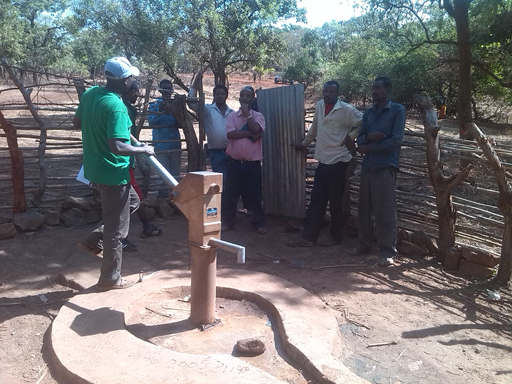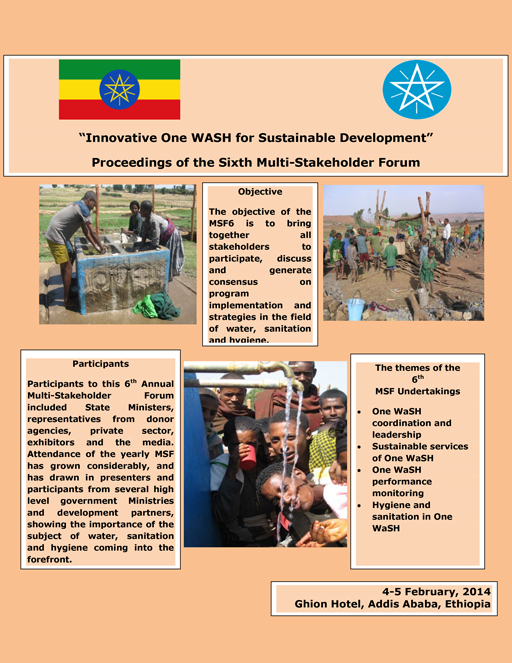11.3.1 The Multi-Stakeholder Forum (MSF)
The largest forum in the WASH calendar in Ethiopia is the Multi-Stakeholder Forum or MSF. This was mentioned in Study Session 9 as one of the mechanisms for collaboration between stakeholders. It brings together all the main stakeholders from government at federal and regional levels of the four WASH ministries, development partners, NGOs, and representatives of the private sector and academic institutions. The first MSF was held in Addis Ababa in 2006 and was attended by over 200 participants. The third forum in 2009 was when the concept of the OWNP was first presented to WASH stakeholders who greeted the idea enthusiastically (WIF, 2011). The fifth and sixth were both held in Addis Ababa in 2012 and 2014. These forums were held over two or three days and chaired by the State Minister of MoWIE. Their purpose was to improve communications between stakeholders and support mutual programme objectives and strategies (USAID, 2014).
Preparations for the MSF illustrate the principles of learning and sharing across the entire WASH sector. Planning for the next forum begin as soon as the outcomes of the previous one have been cascaded to all stakeholders. As part of this process, two other consultative meetings known as Joint Technical Reviews (JTRs) are held in each year. Their purpose is to review progress on previous plans and brainstorm the current key strategic challenges in order to decide on the priority thematic areas for the next MSF. The JTR sends task teams on field visits to selected regions, woredas, towns and kebeles to gather information on the identified topics, using an agreed method and checklist.

The identified themes determine which locations are visited. For example, if self-supply and construction of domestic water supplies at household level is one of the thematic areas, this method is most extensively applied in SNNPR so this would be the selected region for JTR task team visits. If rural gravity schemes (water supply systems distributed over long distances using gravity feeds) are the selected theme, the visits would probably take place in Oromia region because this technology is widely available for review there.
The task team reports on the field visits in the two rounds of the JTR are combined into a single document, which is presented to the National WASH Technical Team in consultation with the National WASH Coordination Office for validation and endorsement. This document informs and directs the work of the organising committee for the next MSF. Note that this document meets the criteria outlined in Section 11.2 for ‘rich’ documentation in that:
- it draws on the background and history from earlier work (e.g. in the previous MSF)
- it reports on current practice gathered during the field visits for the JTR
- it identifies the themes for the next MSF.
Every MSF concludes with a report on the proceedings which is circulated for comments and feedback at regional level. The regions are responsible for ensuring that agreed MSF strategies are cascaded down to zonal, woreda and town level. The front page of the proceedings of the sixth MSF is shown in Figure 11.3.

The MSF proceedings include four or five action points or ‘undertakings’ identified by the delegates that every level of the WASH sector must agree to adopt. Table 11.1 shows the undertakings from the fifth MSF that took place in November 2012.
| Number | Agreed undertaking |
|---|---|
| 1 | Implementation of the One WASH Programme as per the WASH Implementation Framework (WIF) |
| 2 | Implementation of signed MoUs at all levels |
| 3 | Ensuring the functionality of WASH services |
| 4 | Establishment of robust monitoring and evaluation systems |
| 5 | Development of water and improved sanitation safety procedures, capacity and processes. |
It will help you to see how these high-level undertakings contribute to learning and sharing throughout the WASH sector if we take undertaking 2 as an example. Every level in the WASH sector from the regions, zones, woredas and towns each have to sign a version of the national MoU which has been ‘downsized’ in scope to fit their specific context and the responsibilities appropriate to that level. These MoUs are also examples of documentation from the MSF.
11.3 Learning and sharing through WASH sector forums and events
